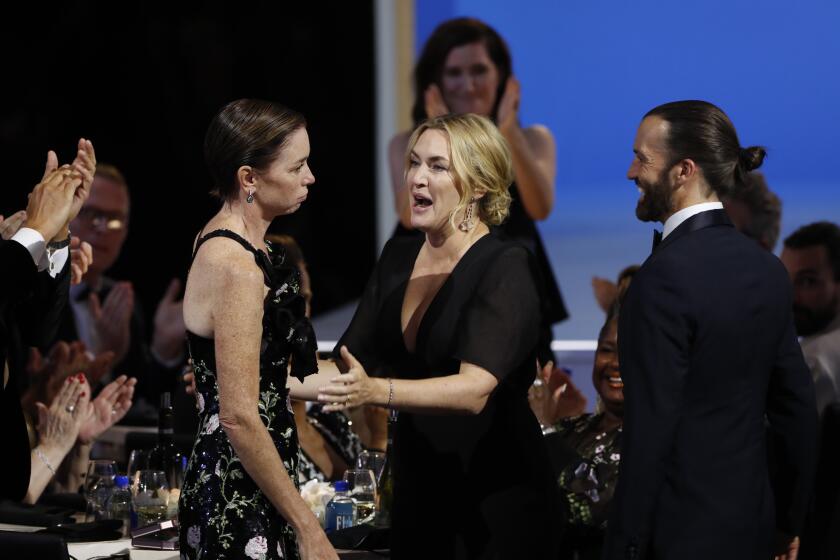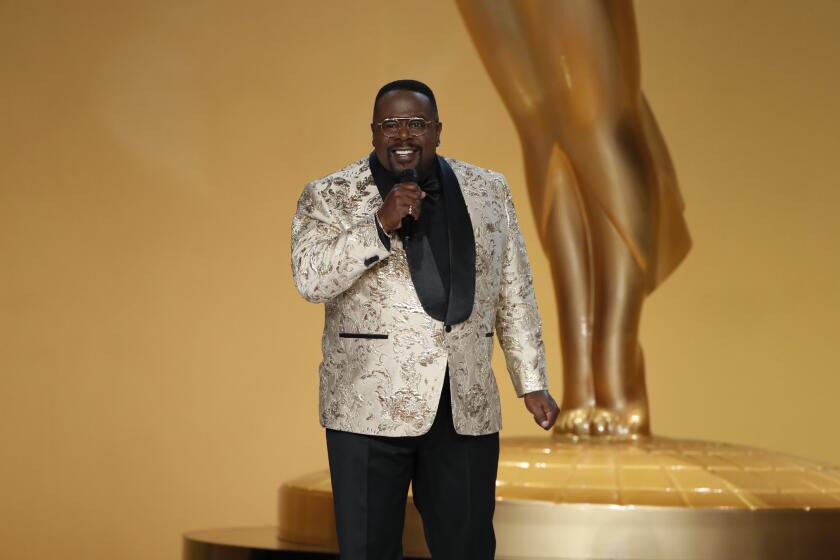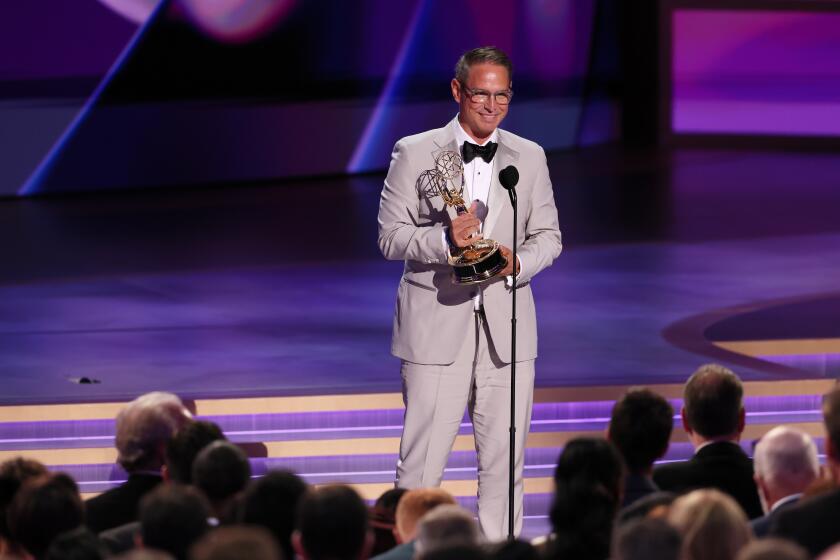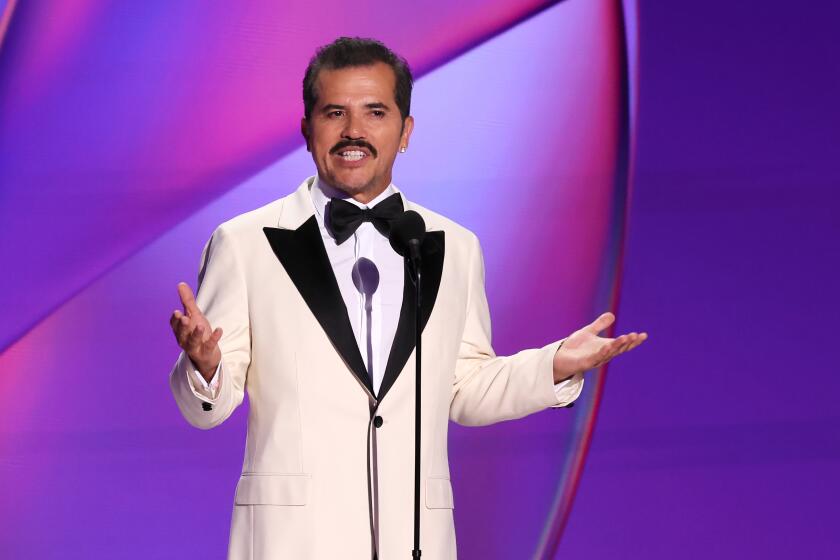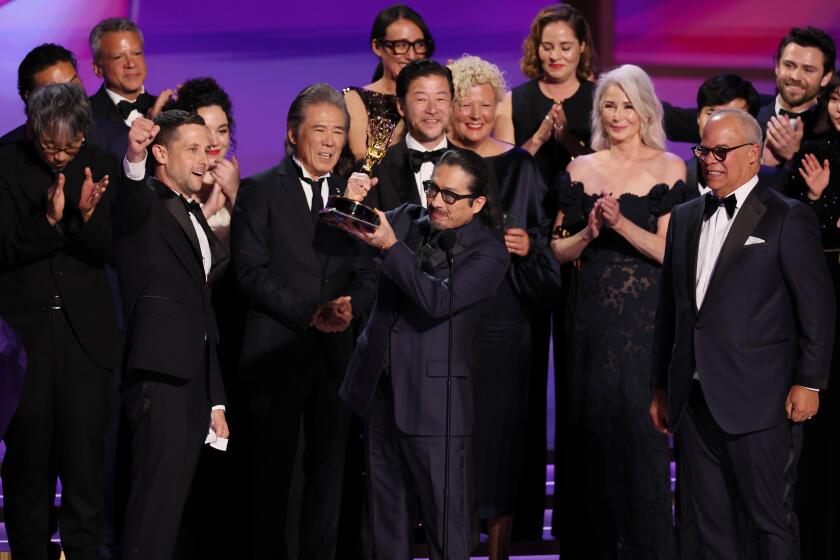The Emmys tried to look diverse. But the show gave us predictable white winners
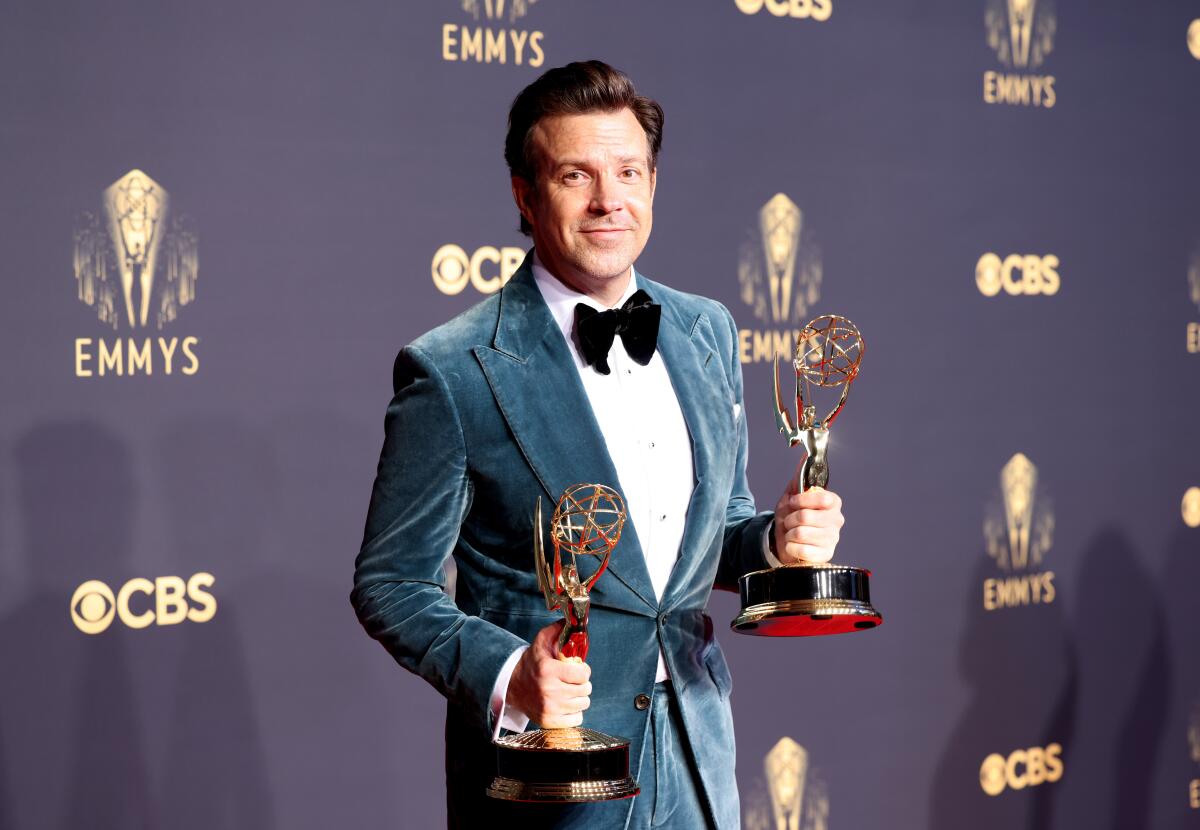
At the 73rd Emmy Awards, favored front-runners “The Crown” and “Ted Lasso” dominated the drama and comedy categories, but the big winners Sunday night were clear: familiarity and caution.
Television Academy voters didn’t take many chances when it came to their top-of-the-ballot choices. Perennial favorite “The Crown” went in with 24 nominations, won 11 awards. Season 4 of Netflix’s series about the royal Windsors swept the major drama categories, including a lead actress win for Olivia Colman, who plays Queen Elizabeth II. Supporting actress Gillian Anderson also won for her excellent portrayal of Margaret Thatcher.
In another non-shocking twist, Apple TV+’s nice-guy comedy “Ted Lasso,” starring Jason Sudeikis as a disarming American football coach running a British soccer team, took home prizes for comedy series, lead actor (Sudeikis), supporting actor (Brett Goldstein) and supporting actress (Hannah Waddingham).
The lack of surprises and the academy’s aversion to more risky choices meant that the Emmys took a step back when it came to racial diversity. No performers of color won in any of the comedy, drama or limited series categories despite some of the strongest contenders in years. And it was nearly two hours into the show when the first person of color stepped onstage to receive an award. RuPaul made Emmy history for the most Emmys won by a person of color when “RuPaul’s Drag Race” landed the outstanding competition series honor for the fourth consecutive year.
Find out the winners of this year’s Emmys right here. We’ll be updating the list live throughout the show.
Tobias Menzies, who plays Prince Philip in “The Crown,” won over the late Michael K. Williams, a sentimental favorite who died unexpectedly this month. Williams, best known for his indelible role as Omar Little in “The Wire,” had been nominated for an Emmy four times but never had won when he made the cut this year for HBO’s “Lovecraft Country.” Though Menzies was a strong contender, there was a palpable disappointment in the room at L.A. Live when Williams and the role that he brought to life — of Montrose Freeman, a gay man in the Jim Crow era — was not recognized.
Josh O’Connor, who plays a young Prince Charles in “The Crown,” won lead actor in a drama series over Billy Porter in “Pose.” Many handicappers and critics believed Porter stood a good chance to win because of his strong performance in the farewell season of the FX drama.
It’s no wonder voters gravitated toward subjects they knew or fare that was easy to digest. The world has doled out enough drama of the real sort to make us all want “Animal Planet” 24/7, just to watch cute koalas calm our central nervous systems. But the academy also has a job to do, and that’s to elevate the best programming on whatever it deems to be television — streaming, cable or network. Kate Winslet winning the lead acting prize for “Mare of Easttown” is one such well-made decision.
Hopes were high that at least the limited series categories would deliver an interesting upset. After all, “The Crown” and “Ted Lasso” could not prevail there. Limited series contests were considered some of the more exciting and up-for-grabs races headed into the evening, and half of social media seemed to be rooting for Michaela Coel’s powerful and rule-bending “I May Destroy You.”
That British HBO series, which dealt with sexual assault, race and identity, was pitted against the HBO crime procedural “Mare of Easttown,” Amazon’s “The Underground Railroad,” Disney+’s “WandaVision” and Netflix “The Queen’s Gambit.” That last title, a period tale about a female chess player in a man’s world, won. Along with “Mare of Easttown, “Queen’s Gambit” nabbed five out of seven of the limited series categories during the Primetime Emmy broadcast. The sweep marked another loss for stories centered on people of color.
The lack of Black, Latinx and Asian winners was at odds with the lineup of the night’s presenters, who without the awards painted a picture of a diversified Hollywood. Taraji P. Henson, Kerry Washington, Angela Bassett, Mindy Kaling and Ken Jeong were among more than a dozen people of color who opened envelopes and called out winners’ names. The ceremony opened with a tribute to the late rapper Biz Markie, who died this year, and music by Run DMC and the Notorious B.I.G. was spun by DJ Reggie Watts as presenters walked on and off camera, and as the show went to commercials. Poor Patrick Stewart looked confused.
The race questions the Emmys inevitably stirred detracted from what was another groundbreaking year for women in television. When Jessica Hobbs of “The Crown” and Lucia Aniello of “Hacks” won, they became the first women to sweep both the comedy and drama directing categories.
The approach was not inappropriate to a medium whose productions have largely glossed over the pandemic. And it was sometimes fun — if nerve-racking.
When double Emmy nominee Jean Smart was named best comedy actress for her role as stand-up Las Vegas comedian Deborah Vance in “Hacks,” the 70-year-old became the oldest woman to win the category. (Catherine O’Hara was 66 when she won in 2020 for her role as Moira Rose in “Schitt’s Creek.”) Hollywood’s ageism is finally seeing a challenge.
The three-hour ceremony broadcast live on CBS was anything but business as usual. The event took place at a small L.A. Live venue rather than the Microsoft Theater. Only 500 guests were permitted to attend due to COVID-19 restrictions, compared with several thousand in previous years. The show, helmed by master of ceremonies Cedric the Entertainer, was plagued by production flubs: stagehands walking into shots, missed cues, awkward outros from a DJ more attuned to a Grammy crowd rather than the TV industry.
At least “I May Destroy You” creator-star Coel finally won an Emmy — writing for a limited or anthology series or movie. She may as well have been speaking directly to the voters who chose safety over innovation. She encouraged those in the room as well as future talent to take chances.
“I just wrote a little something for all the writers, really,” she said. “Write the tale that scares you, that makes you feel uncertain, that isn’t comfortable. I dare you.”
More to Read
The complete guide to home viewing
Get Screen Gab for everything about the TV shows and streaming movies everyone’s talking about.
You may occasionally receive promotional content from the Los Angeles Times.
